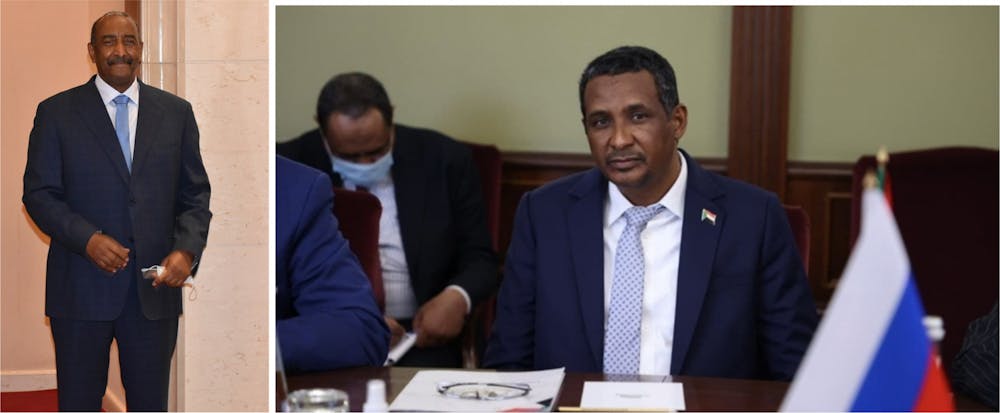By Gauri Patel
Staff Writer
On April 15, violence broke out in Sudan's capital city, Khartoum, between the Sudanese Armed Forces (SAF) and the Rapid Support Forces (RSF) over control of the country. The clashes erupted amid a power struggle between the two rival groups, led by two military leaders each vying for power, according to The Guardian.
Sudan’s military forces broadly support General Abdel Fattah al-Burhan, the country’s de facto ruler, while the country’s main paramilitary force, the Rapid Support Forces (RSF) are loyal to the former warlord General Mohamed Hamdan Dagalo, known as Hemedti.
The two military leaders were once allies who had joined forces to successfully oust Sudanese President Omar al-Bashir in 2019 after widespread unrest. They also played a pivotal role in the military coup in 2021 following the collapse of the Western-backed government of Prime Minister Abdalla Hamdok, according to CNN. By joining forces in the coup, they seized power and derailed Sudan’s short-lived path to democracy.
In December 2022, both generals signed a framework with 40 civil groups agreeing to transition away from military rule towards a civilian government after pressure from democracy campaigners, according to NBC. However, tensions rose during negotiations on how to integrate the RSF into the country’s military, a key part of the framework agreement, as both sides disagreed on what authority should oversee the process. The army wants the transition to happen in two years, while the RSF said it could take 10 years. The deadline to sign an agreement, April 11, has passed without clear answers.
The key question behind the agreement revolves around who would be dominant under the new hierarchy. According to sources who spoke to CNN, the hostilities between both groups are the culmination of what both parties view as an existential struggle for control.
Fighting has been ongoing since April 15, with fighter jets, gunfire and violent explosions being heard throughout the capital and beyond. Volker Perthes, the United Nations special representative to Sudan, told reporters by video link from Khartoum on April 17 that at least 185 people had been killed and more than 1,800 had been injured, as civilians have been caught in the crossfire between the rival groups. The casualties are expected to rise with the ongoing violence, according to ABC News.
Fears rise for the humanitarian situation in Sudan as civilians have been caught in the crossfire between the two rival groups. Residents have been forced to shelter in their homes, with shops shut and streets largely deserted. Burnt-out vehicles littering the streets, power cuts and food and water scarcity have become common in main cities, like Khartoum, Omdurman and Bahri.
According to ABC News, out of a population of 46.7 million, it is estimated that about 15 million people in the country face acute food insecurity. However, the U.N. World Food Program halted its work after three of its staff members who were working in Sudan's hunger-stricken North Darfur state were killed.
U.S. diplomatic workers have also been targeted. On April 17, a U.S. diplomatic convoy was fired upon in Khartoum, but those inside were unharmed, according to U.S. Secretary of State, Antony Blinken.
"I can confirm that yesterday we had an American diplomatic convoy that was fired on," Blinken told reporters at a press conference at the end of the G7 Foreign Ministers summit in Japan. "All of our people are safe and unharmed, but this action was reckless, it was irresponsible and, of course, unsafe.”
Blinken said the vehicles in the convoy had diplomatic license plates and were marked with U.S. flags, and preliminary reports indicate the attack was undertaken by forces associated with the RSF.
Blinken said to reporters that he spoke separately with Generals Burhan and Dagalo via phone call, making it "very clear that any attacks, threats, dangers posed to our diplomats were totally unacceptable." During the phone calls, he urged Generals Burhan and Dagalo to agree to a 24-hour ceasefire to allow the Sudanese to safely reunite with their families and to obtain relief supplies. According to CBS, there were reports that the Sudanese army had agreed to the 24-hour ceasefire beginning the evening of April 17 after the paramilitary also agreed to the same.
Just hours after the start of the temporary ceasefire, clashes re-erupted north of Khartoum with each faction issuing statements accusing the other of violating the truce, according to CNN.
On April 20, U.N. Secretary-General Antonio Guterres called for a three-day ceasefire over the Muslim Eid al-Fitr holiday to allow civilians to reach safe areas to seek medical treatment, food and other supplies. The United States endorsed the ceasefire proposal, according to Reuters.
Guterres and senior officials from the U.S., European Union, Saudi Arabia, Qatar, Turkey and Egypt have called for an end to the violence.
“The situation has already led to horrendous loss of life, including many civilians. Any further escalation could be devastating for the country and the region,” remarked Guterres in a statement. “I urge all those with influence over the situation to use it in the cause of peace; to support efforts to end the violence, restore order, and return to the path of transition.”







